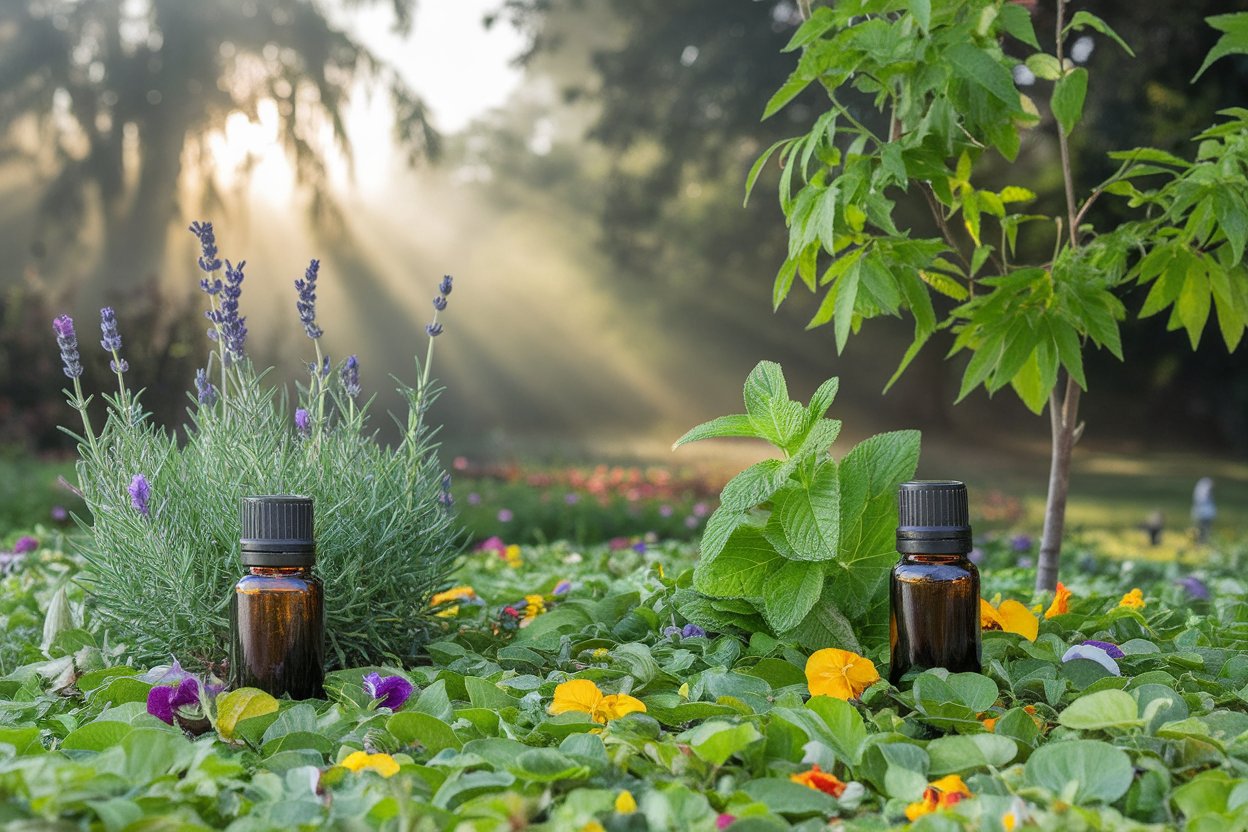Essential oils are not only for aromatherapy or skin care; You can also be valuable tools in your garden.
These natural, plant -based oils offer a number of advantages, from deterring pests and promoting plant health to improving soil quality. With their versatile applications and its environmentally friendly nature, essential oils are a must for every gardener.
Here are some of the best essential oils that you can include in your garden routine and how you can use them effectively.
Peppermint oil
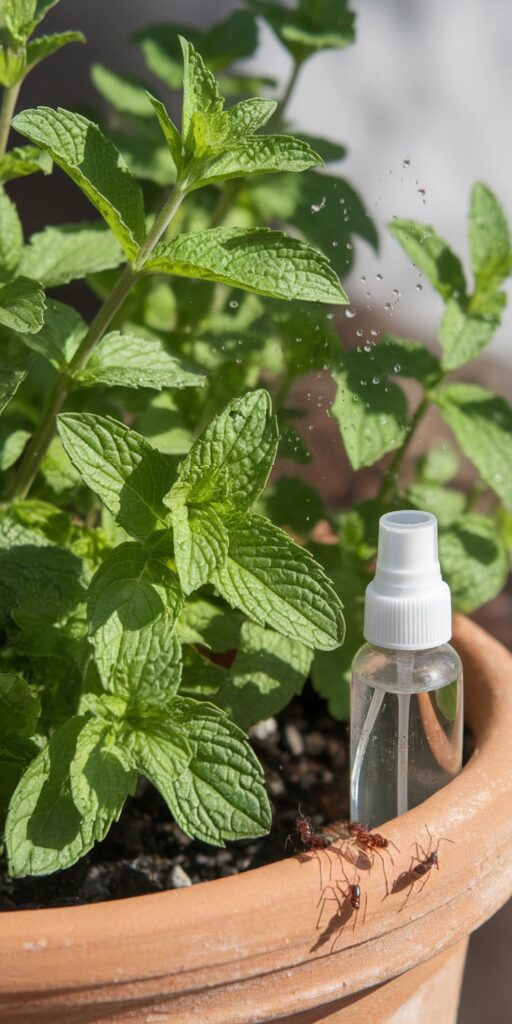
Essential peppermint oil is a power package for the deviation of pests. Its strong, Minnziges aroma is uncomfortable for ants, aphids, beetles and even spiders, which makes it a highly effective natural pest protector.
To use peppermint oil, mix a few drops with water in a spray bottle and attach your plants. For additional protection, you can also spray the mixture around the scope of your garden to prevent pests from penetrating.
Advantages:
- Natural pesticides for a variety of insects
- Refreshing fragrance that serves as aromatherapy
- Keep rodents like mice and keeps their garden -free free
Bonus tip:
Apply peppermint oil on cotton balls and place it strategically in your garden to create an invisible barrier against pests.
Lavender oil
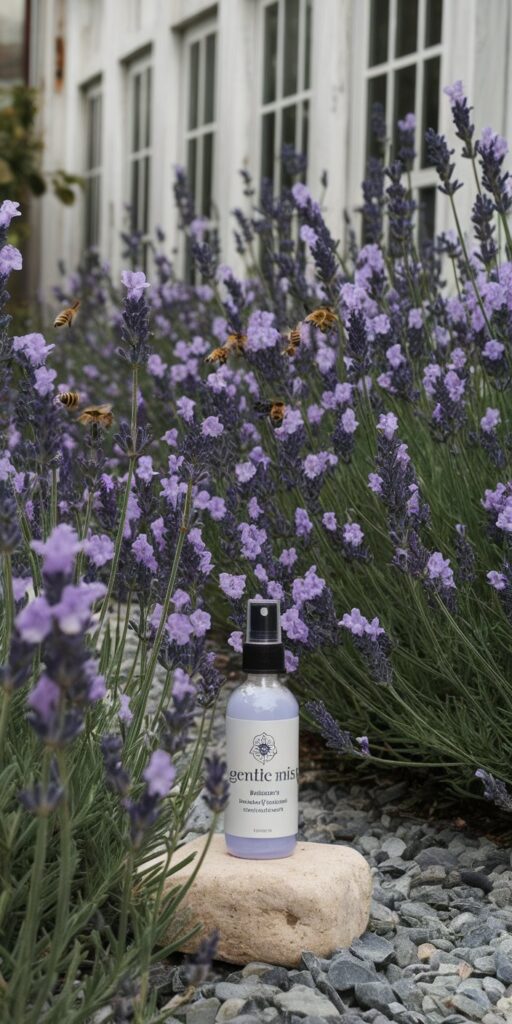
Lavender is known for its calming properties, but it is also a fantastic addition in your garden. Its floral smell naturally protects mosquitoes, moths and flies and at the same time attracts beneficial pollinators such as bees and butterflies.
This double benefit makes lavender oil indispensable for every pollinating -friendly garden.
Advantages:
- Effectively peel off harmful insects
- Put on pollinators to support plant reproduction
- If your garden increases a pleasant, soothing aroma
Application:
Create a lavender oil spray by mixing 10-15 drops of the oil with water and a small amount of shoring soap to adhere to the solution on the leaves. Easy fog plants for maximum protection.
Citrus oil (lemon or orange)
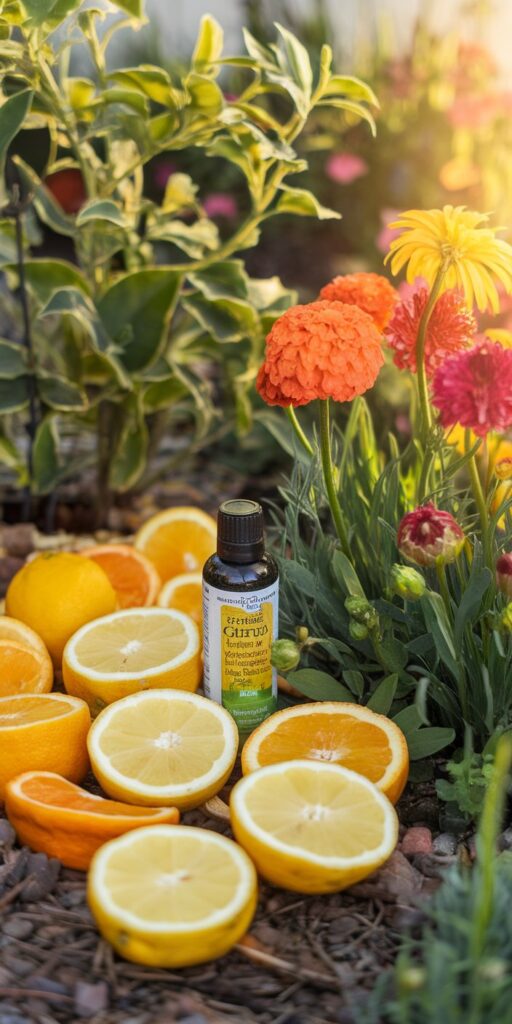
Citrus oils such as lemon and orange are excellent in warding off snails and ants.
Your brighter, panicked fragrance also refreshes your garden room and makes it more pleasant to work on it. The natural antimicrobial properties of Citrus Oil can even benefit the health of the soil by reducing harmful bacteria and fungi.
Advantages:
- Keeps the snow and ants away in a natural way
- Refreshes your garden environment
- Antimicrobial properties improve soil health
Use tip:
Combine citrus oil with vinegar for a strong weed solution that is safe for your plants, but hard in invasive weeds.
Tea
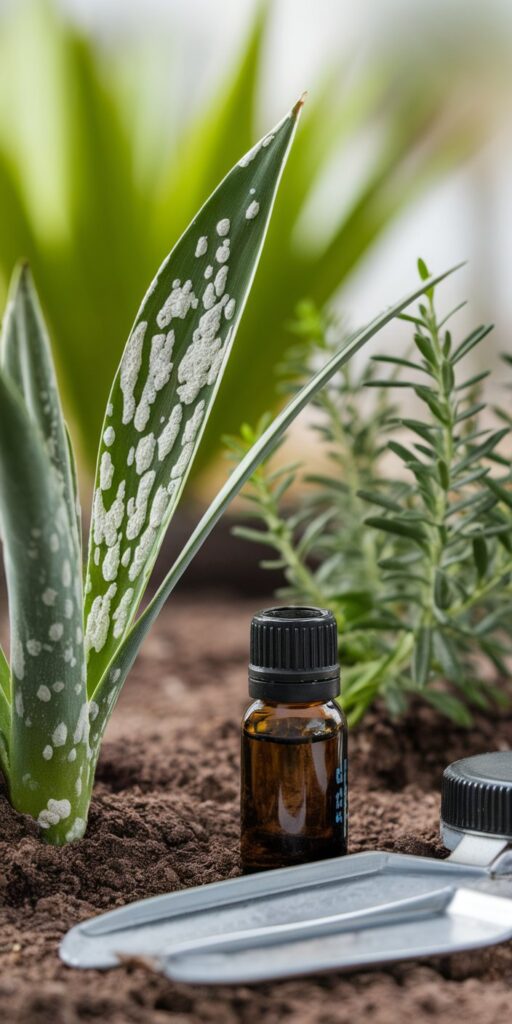
Tea tree oil is a multi -purpose garden that is essential. Its antifungal and antibacterial properties make it very effective against frequent plant diseases such as mildew and black spot.
It is also a good choice to disinfect garden tools and pots.
Advantages:
- Treats fungal infections that threaten the health of the plants
- Acts as a natural disinfectant for soil and tools
- Promotes healthier plants by combating harmful pathogens
How to use:
Mix the tea tree oil with water and apply directly to affected plants. For tools, dilute the oil in water and wipe the surfaces with a cloth.
Eucalyptus oil
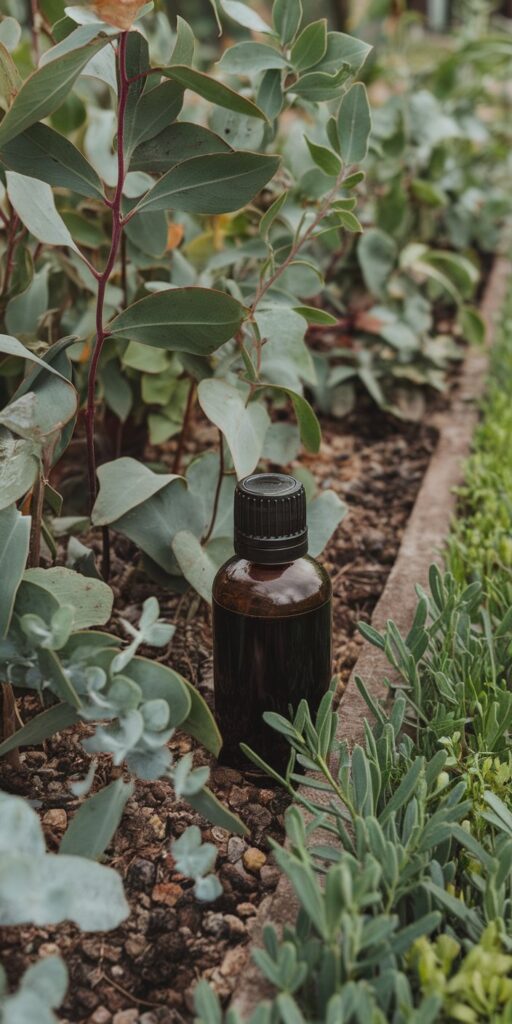
The strong aroma of Eucalyptus Oil makes it a strong deterrent against flies, moths and cockroaches.
Its antimicrobial effects also help to maintain a healthier garden environment. Use it as a spray on plant leaves or garden boundaries to keep the pests in chess.
Advantages:
- Strong pest shooters
- Antimicrobial properties protect plants and soil
- Stimulates plant growth with its natural connections
Pro tip:
Add eucalyptus oil to a garden diffuser to create a pest -free and fragrant outdoor area for relaxation and gardening.
Rosemary oil
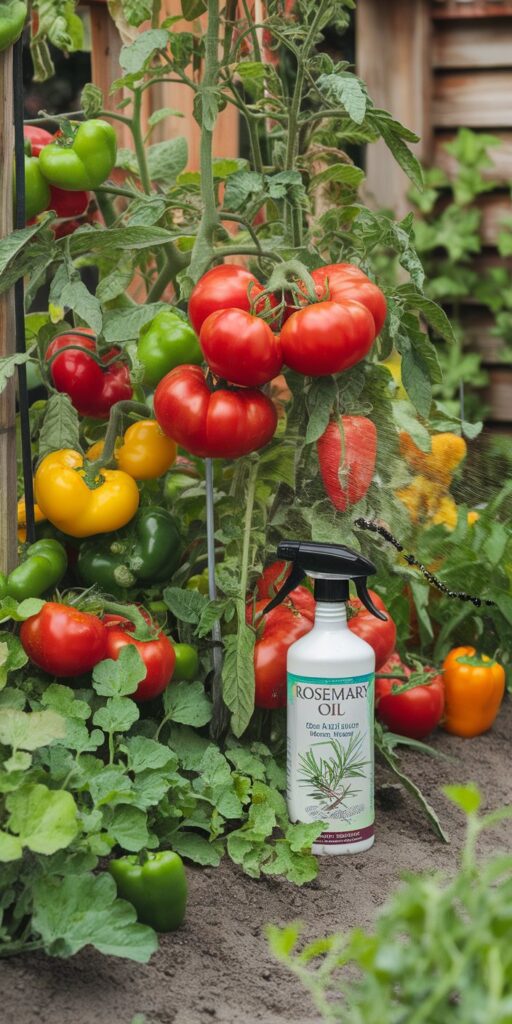
Rosemary essential oil is a natural insecticide that effectively aims at mosquitoes, coal moths and other shared garden pests.
It is also known that it improves the taste of accompanying plants such as tomatoes and peppers, which makes it a popular choice for edible gardens.
Advantages:
- Protects plants from destructive insects
- Improves the taste profile of accompanying plants
- Encourages the activities of the pollinators in their garden
Application idea:
Use rosemary oil in a garden spray to protect vegetables and herbs while increasing your overall output and your taste.
Zedarholz oil

Cedarwood oil is ideal for the defense against fleas, ticks and moths, which makes it a must for animal-friendly gardens.
Its earthy fragrance also gives your outer space an ground and pleasant aroma.
Advantages:
- Put tickets, fleas and other pests
- Long -term protection for your plants
- Environmentally friendly and safe for pets
Additional insight:
Mix cedar wood oil with pebbles for an even more effective natural pest barrier.
Clove oil
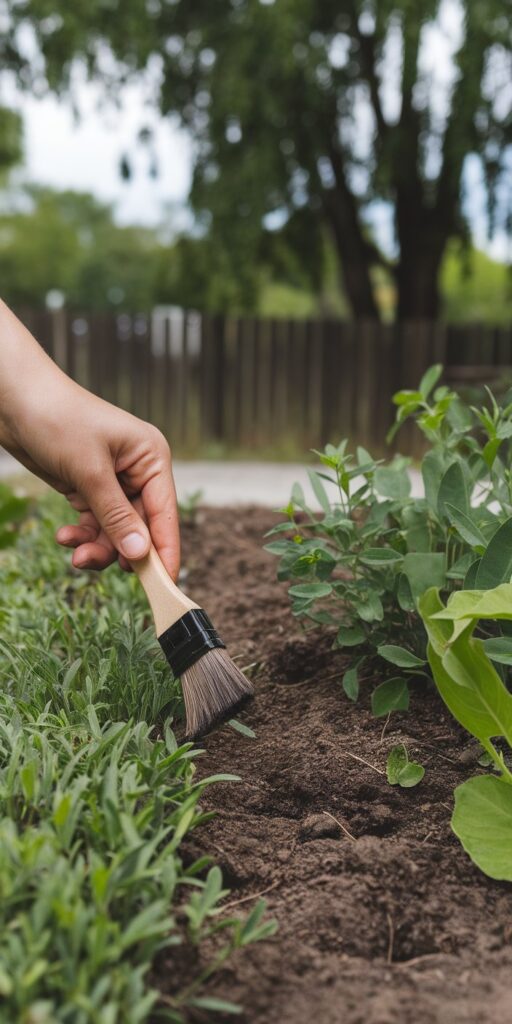
Nelken oil is a strong herbicide with which weeds can be managed naturally. The antifungal properties also help to reduce floor pathogenic, which makes it a great option for organic gardeners.
Advantages:
- Natural weed control without harmful chemicals
- Animycotic properties support healthy soil
- Reduces pathogens that can damage plant roots
Weed management:
Apply clove oil with a brush or spray bottle directly on weeds.
Basil oil
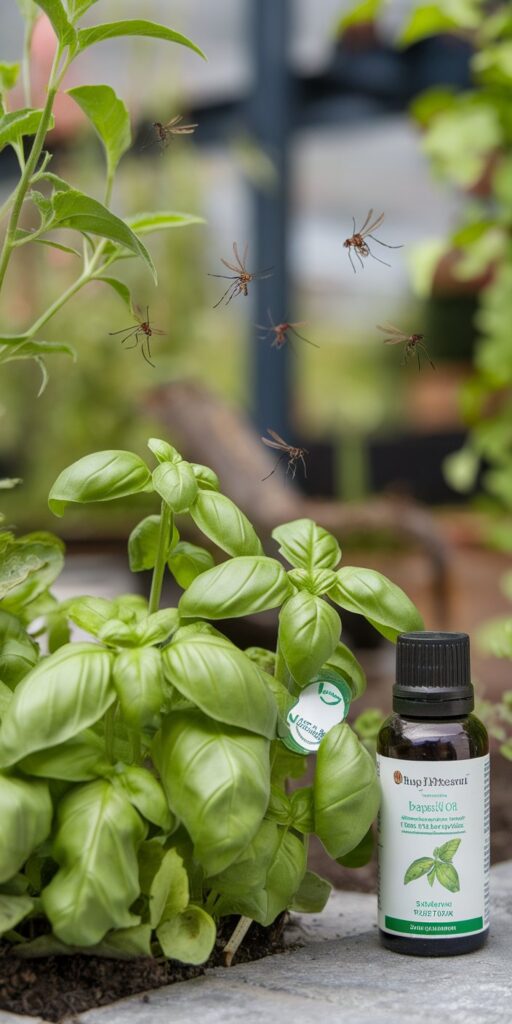
The strong fragrance of Basil Oil is very effective in keeping flies, mosquitoes and other flying pests away from your garden.
It is also an advantageous companion for plants such as tomatoes and peppers that promote healthier growth and yield.
Advantages:
- Naturally holds flying pests
- Increases the growth of accompanying plants
- Safe and environmentally friendly for organic garden work
Pro tip:
Use basil oil in combination with peppermint oil for a wider spectrum of pest control.
Neem oil
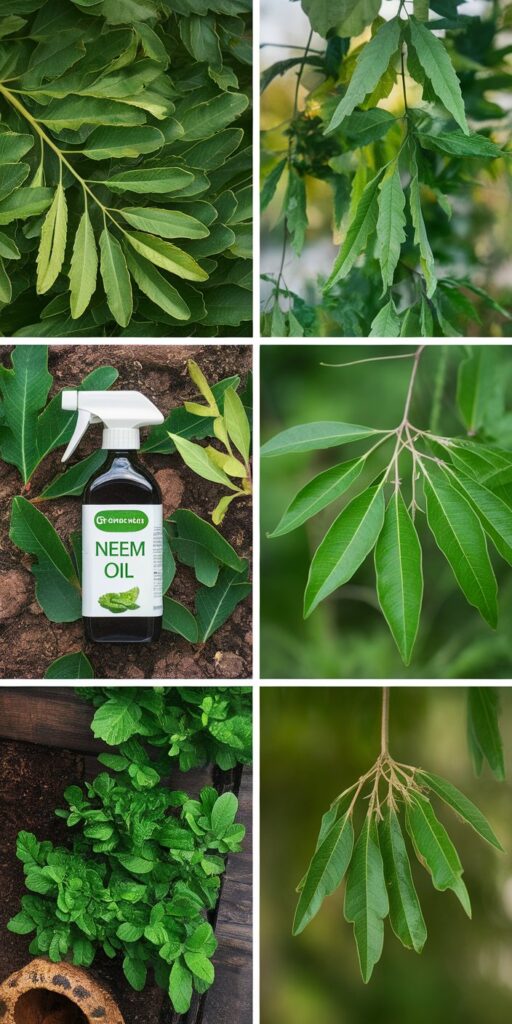
Neem Oil is a staple in organic garden work and offers a versatile solution for the management of a variety of pests such as aphids, white flying and spider mites.
It also improves soil quality by preventing fungal infections and promoting advantageous microbes.
Advantages:
- Effective against a variety of pests
- Antimycotic and antibacterial properties
- Improves the health of the soil and the resilience of the plants
Application advice:
Use neem oil as a leaf spray and apply it early in the morning or late in the evening to avoid sunburn on leaves.
Tips for using essential oils in the garden:
- Dilution is the key: Always dilute essential oils before applying plants to prevent damage to leaves and stems.
- Use a carrier oil: Combine essential oils with carrier oils such as coconut or olive oil to increase your effectiveness and even to ensure the application.
- Test first: Conduct a patch test in a small part of a system to check for disadvantageous reactions before using a broader use.
- Combine oils: Create customer -specific mixtures of essential oils to go to several garden problems at the same time.
- Timing is important: Use oils during cooler parts of the day to prevent evaporation and maximize their advantages.
By integrating these essential oils into your garden routine, you can of course grow a flowering, pest -free and aromatic garden.
Experiment with these oils to find the perfect combination for the individual needs of your garden, and enjoy the satisfaction of a healthier, more lively outside.
Unlock the Power of Nature: 10 Must-Have Essential Oils for a Thriving Garden!
Are you looking to take your gardening game to the next level? Why not harness the power of nature with essential oils? Essential oils are not only known for their aromatic qualities but also for their various benefits in gardening. From repelling pests to promoting plant growth, essential oils can be a valuable addition to any garden enthusiast’s toolkit.
In this article, we will explore 10 must-have essential oils for a thriving garden, along with their benefits and practical tips on how to use them effectively. Let’s dive in and discover how you can unlock the power of nature in your garden!
- Lavender Essential Oil
- Benefits: Lavender oil is known for its calming and soothing properties. In the garden, it can help repel pests such as mosquitoes, flies, and fleas.
- Practical Tips: Dilute a few drops of lavender oil in water and spray it around your garden to keep pests at bay.
- Peppermint Essential Oil
- Benefits: Peppermint oil has a strong scent that deters many common garden pests, including ants and spiders.
- Practical Tips: Mix peppermint oil with water and a mild soap to create a natural insect repellent spray for your plants.
- Tea Tree Essential Oil
- Benefits: Tea tree oil is a natural antifungal and antibacterial agent, making it great for treating plant diseases.
- Practical Tips: Mix a few drops of tea tree oil with water and spray it on affected plants to help combat fungal infections.
- Eucalyptus Essential Oil
- Benefits: Eucalyptus oil is effective at repelling pests such as aphids, whiteflies, and beetles.
- Practical Tips: Dilute eucalyptus oil in water and spray it on plant leaves to deter insects.
- Rosemary Essential Oil
- Benefits: Rosemary oil has antioxidant and antifungal properties, making it a great natural pesticide for your garden.
- Practical Tips: Mix rosemary oil with water and a carrier oil like olive oil to create a homemade insect repellent for your plants.
- Lemon Essential Oil
- Benefits: Lemon oil is a natural insecticide and can help deter pests like ants, aphids, and beetles.
- Practical Tips: Add a few drops of lemon oil to a spray bottle filled with water and spray it on plants to protect them from pests.
- Cedarwood Essential Oil
- Benefits: Cedarwood oil is a natural moth repellent and can help keep pests away from your garden.
- Practical Tips: Soak cotton balls in cedarwood oil and place them around your garden to repel insects.
- Lemongrass Essential Oil
- Benefits: Lemongrass oil has antifungal and antibacterial properties, making it great for preventing plant diseases.
- Practical Tips: Mix lemongrass oil with water and spray it on plants to help prevent fungal infections.
- Geranium Essential Oil
- Benefits: Geranium oil can repel common garden pests like mosquitoes, ticks, and beetles.
- Practical Tips: Mix geranium oil with water and spray it around your garden to keep pests away.
- Thyme Essential Oil
- Benefits: Thyme oil is a natural insect repellent and can help protect your plants from pests.
- Practical Tips: Dilute thyme oil in water and apply it to plant leaves using a spray bottle to deter insects.
essential oils can be a powerful tool for promoting a thriving garden. From repelling pests to preventing plant diseases, these natural oils offer a myriad of benefits for your plants. By incorporating essential oils into your gardening routine, you can create a healthier and more vibrant garden environment. So why not unlock the power of nature in your own garden today?
Try experimenting with these 10 must-have essential oils for a thriving garden and see the amazing results for yourself. Your plants will thank you for it!
 redboth.com Decoration ideas for your home
redboth.com Decoration ideas for your home
